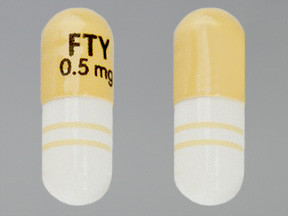FINGOLIMOD - ORAL
PHONETIC PRONUNCIATION: (fin-GOL-i-mod)
COMMON BRAND NAME(S): Gilenya
GENERIC NAME(S): fingolimod HCl
Uses
USES: This medication is used to treat a certain type of multiple sclerosis (relapsing multiple sclerosis-MS). It is not a cure for MS but it is thought to help by preventing immune system cells (lymphocytes) from attacking the nerves in your brain and spinal cord. It helps decrease the number of episodes of worsening and may prevent or delay disability.
How to use FINGOLIMOD - ORAL
HOW TO USE: Read the Medication Guide provided by your pharmacist before you start taking fingolimod and each time you get a refill. If you have any questions, ask your doctor or pharmacist. Before starting fingolimod, your doctor will do medical/laboratory tests (such as complete blood count, blood pressure, EKG, pulse, eye exam) to monitor for side effects. Take this medication by mouth with or without food as directed by your doctor, usually once a day. You will be monitored for at least 6 hours after the first dose to make sure your heartbeat does not go too slow. A very slow heartbeat increases the risk for a serious heart rhythm problem (QT prolongation in the EKG). Tell your doctor if you have low levels of magnesium/potassium in the blood, personal or family history of QT prolongation in the EKG, family history of sudden cardiac death, or heart failure. Also tell your doctor if you are taking other drugs that can slow down your heartbeat or affect heart rhythm (such as causing QT prolongation in the EKG). See also Drug Interactions section. If you temporarily stop taking fingolimod after starting treatment, you may need to be monitored again for at least 6 hours after you restart this medication. Children who have their dose of the medication increased may also need to be monitored again for 6 hours. Ask your doctor for details. The dosage is based on your age and weight. Do not increase your dose or take this medication more often than prescribed. Your condition will not improve any faster, and the risk of serious side effects may be increased. Take this medication regularly to get the most benefit from it. To help you remember, take it at the same time each day. Tell your doctor if your condition does not improve or if it worsens.
Side Effects
Precautions
Interactions
Overdose
Images
Reviews
Faq for FINGOLIMOD - ORAL
Fingolimod is an oral medication used for the treatment of multiple sclerosis (MS). It helps to reduce the number of relapses and slows down the progression of the disease.
Fingolimod works by preventing certain immune cells (lymphocytes) from reaching the central nervous system, where they can cause damage. This helps to reduce inflammation and prevent further damage in MS patients.
The common side effects of fingolimod include headache, diarrhea, increased liver enzymes, cough, and back pain. Some patients may also experience an increased risk of infections, macular edema, and a slower heart rate.
Fingolimod may take several weeks to months to show its full effects. It is important to continue taking the medication as prescribed by your doctor, even if you do not notice immediate improvements.
It is generally not recommended to drink alcohol while taking fingolimod. Alcohol can interact with the medication and increase the risk of side effects. It is best to consult with your doctor for specific advice regarding alcohol consumption.
Fingolimod is not recommended during pregnancy as it can cause harm to the developing fetus. It is important to use effective contraception while taking fingolimod and discuss family planning with your doctor.
It is important to inform your doctor about all the medications you are currently taking before starting fingolimod. Some medications may interact with fingolimod and affect its effectiveness or increase the risk of side effects. Your doctor will be able to advise you on any necessary adjustments or alternative medications.
Fingolimod is not a cure for multiple sclerosis. It is used to manage the symptoms and slow down the progression of the disease. It is important to continue taking the medication as prescribed by your doctor for long-term management of MS.
It is important to consult with your doctor before stopping fingolimod. Abruptly stopping the medication can lead to a rebound effect and may worsen your condition. Your doctor will provide guidance on how to safely discontinue the medication if needed.
Disclaimer
IMPORTANT: HOW TO USE THIS INFORMATION: This is a summary and does NOT have all possible information about this product. This information does not assure that this product is safe, effective, or appropriate for you. This information is not individual medical advice and does not substitute for the advice of your health care professional. Always ask your health care professional for complete information about this product and your specific health needs.


No Reviews Yet